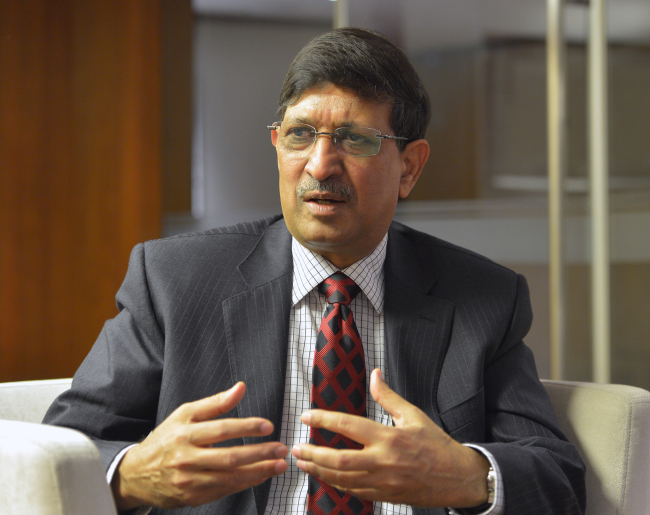Korean companies may participate in India’s infrastructure construction and forge even greater economic ties with India in the future, the head of the Indian Chamber of Commerce in Korea said Thursday.
“The Indian government is expected to invest more in the field of infrastructure over the next 20 years. Korea already has experience in the area and perhaps can take part (in the projects),” said Shashi Maudgal, chairman of ICCK and president of Novelis Asia.
“The Indian government is expected to invest more in the field of infrastructure over the next 20 years. Korea already has experience in the area and perhaps can take part (in the projects),” said Shashi Maudgal, chairman of ICCK and president of Novelis Asia.

Maudgal pointed to Samsung C&T, a subsidiary of Samsung that previously participated in a metro construction project in Delhi. Currently, Korea and India’s most active business exchanges are in automotive parts and defense materials, and more business circles beween the two nations have been forging relations following President Park Geun-hye’s state visit to India last month.
“There will be more cooperation in the future,” Maudgal added.
As the head of the Asian headquarters of the world’s largest producer of rolled aluminum sheets, Maudgal also expressed hopes to expand Novelis’ business in Korea.
Aluminum-bodied vehicles have become a hot issue here, reflecting international and local regulations on greenhouse gas emissions and the calls for better fuel efficiency.
Prestigious auto brands including the Jaguar Land Rover and Mercedes-Benz have released aluminum-bodied models that they claim have enhanced fuel efficiency and improved safety.
And it’s not just the upscale car market ― Ford has introduced a new F150 pickup truck with an aluminum body while GM also announced plans to produce aluminum-bodied trucks.
Novelis is the supplier for about half of the aluminum material used for the Ford model. It also supplies Hyundai’s New Genesis and Equus models, which are partly made of aluminum.
Reflecting such fast growth, Novelis has completed a $400 million project for expanding its aluminum rolling mill in Yeongju, North Gyeongsang Province.
Maudgal believes he has more to do in Korea, comparing the marriage of aluminum technology and the automotive industry as a “snowball that is about to roll off the hill” to illustrate its potential.
Given that all passenger cars would have to achieve an average 17 kilometers per liter of fuel efficiency by 2015, and that the Korean government is considering further tightening the regulation to 20 kilometers per liter, aluminum cars certainly stand a big chance here.
“The initial cost of cars with an aluminum body is higher but it can be offset over a short period time,” the CEO said.
He added that a 10 percent reduction of weight would cut fuel use and greenhouse gas emissions by up to 7 percent, stressing that while initial costs may appear to be high, eventually there would be a “clear bonus.”
By Bae Ji-sook (baejisook@heraldcorp.com)
-
Articles by Korea Herald





![[Herald Interview] 'Amid aging population, Korea to invite more young professionals from overseas'](http://res.heraldm.com/phpwas/restmb_idxmake.php?idx=644&simg=/content/image/2024/04/24/20240424050844_0.jpg&u=20240424200058)












![[KH Explains] Korean shipbuilding stocks rally: Real growth or bubble?](http://res.heraldm.com/phpwas/restmb_idxmake.php?idx=652&simg=/content/image/2024/04/25/20240425050656_0.jpg&u=)

